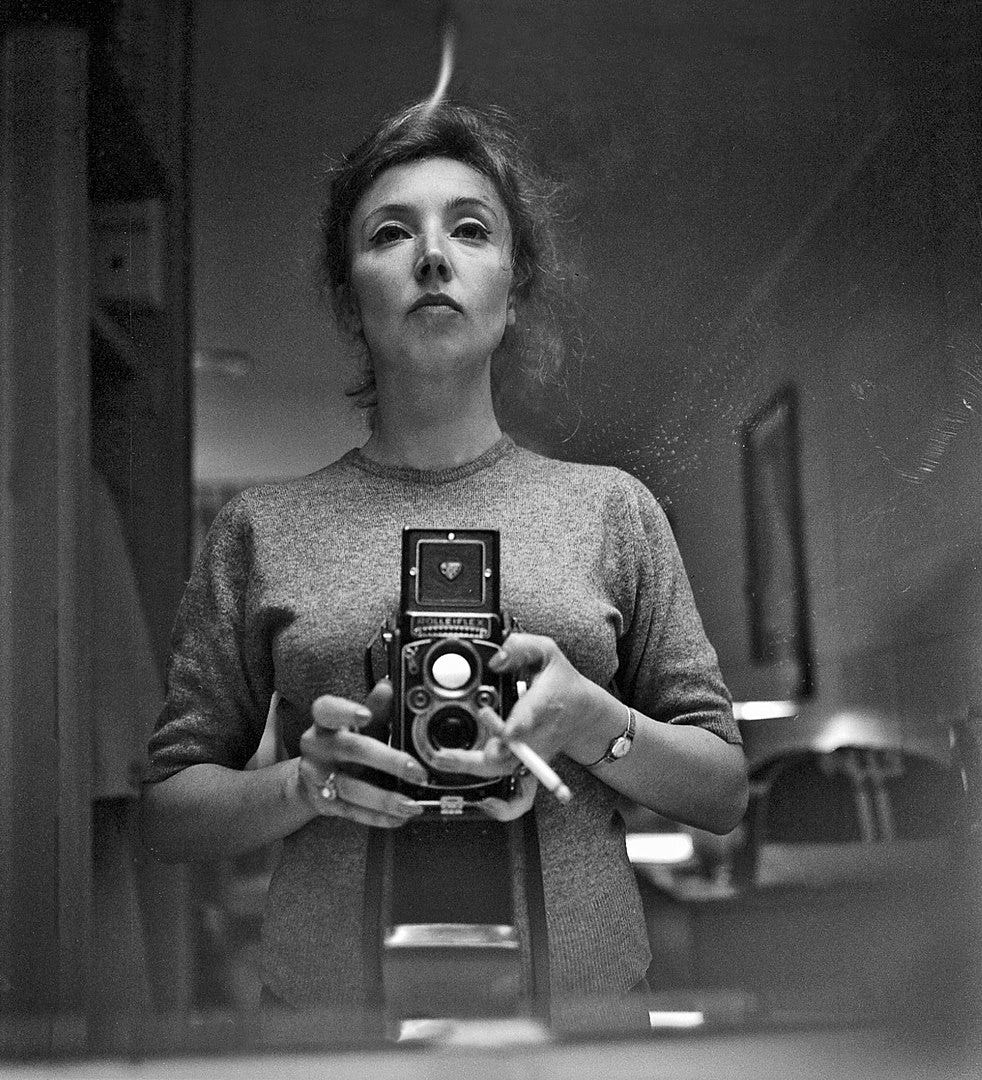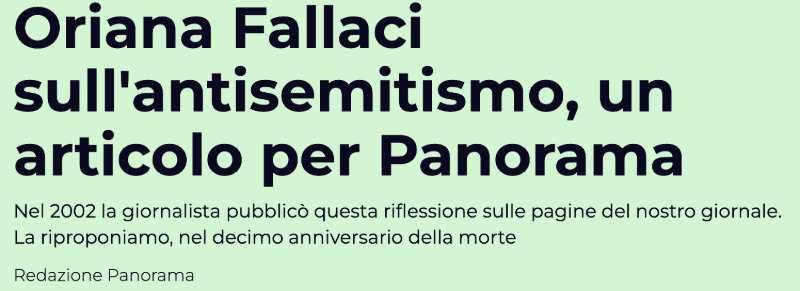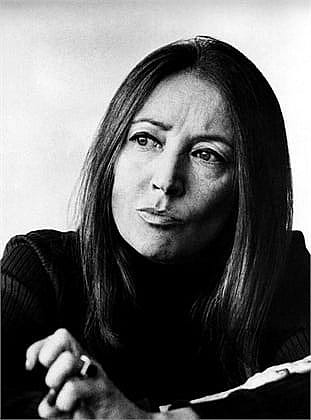Oriana Fallaci’s “Shame”: A Fiery Defense of Israel and a Warning Against Rising Antisemitism.
In 2002, Italian Weekly Panorama Published a Powerful Essay by the Iconic Journalist on Europe's Rising Anti-Semitism.
Oriana Fallaci (29 June 1929 - 15 September 2006) fought as a teenage partisan in the Second World War before becoming a journalist. She rose to become not only Italy's most famous journalist, but one of the world's most celebrated reporters - arguably the most renowned female journalist of her time.
During the Cold War, her hard-hitting interviews with world leaders made her a global icon of journalism. These conversations - with the likes of Golda Meir, Yasser Arafat, Indira Gandhi, Henry Kissinger, Deng Xiaoping and Ayatollah Khomeini - filled two books that are still in print today.
Although often critical of American foreign policy, particularly in Vietnam and the Middle East, she admired the power and cultural strength of the United States. In the late 1980s, she retired from journalism to become a university lecturer, making New York her home, with periodic visits to her beloved Tuscany.
She broke her silence after 9/11 with an article that became a book, The Rage and the Pride (2001). In it, she openly accused Islam of being the enemy of Western civilisation, while condemning Westerners as weak and decadent, unable to acknowledge the threat and act before it was too late. The book became a global bestseller and was followed by The Force of Reason (2004) and her final testament: Oriana Fallaci Interviews Herself - The Apocalypse. Together, these three books have sold over five million copies worldwide. Her life was so extraordinary that it could have been a novel - and did become a television drama. But her books - each and every one of them - deserve to be read and reread, now more than ever, to understand what excellent journalism really is: masterful storytelling driven by passion.
When Fallaci published her pamphlets after 9/11, critics accused her of fomenting a clash of civilisations, of being divisive and polarising, of preferring war to peace. In retrospect, perhaps we should have read her words more carefully.
Fallaci was Tuscan. Although she was not Jewish, she was deeply and passionately Zionist. In 2002 she wrote this opinion piece for the Italian weekly Panorama (then a prestigious publication, now diminished - like many historical journals in an increasingly less literary Italy). You can find it at this link:
This is an extract which I have translated faithfully to the original text and source, with notes to provide context after twenty-three years. Its message is as powerful and relevant today as it was in April 2002.
Oriana Fallaci:
I find it shameful that in Italy there is a parade of people who, dressed as suicide bombers, shout vile insults at Israel, hold up photographs of Israeli leaders with swastikas drawn on their foreheads, and incite people to hate Jews. And who would sell their own mother to a harem just to see Jews again in the death camps, in the gas chambers, in the crematoria of Dachau and Mauthausen and Buchenwald and Bergen-Belsen and so on.
I find it shameful that the Catholic Church allows a bishop, who is, moreover, housed in the Vatican, a paragon of virtue, who was found in Jerusalem with an arsenal of weapons and explosives hidden in special compartments of his holy Mercedes, to take part in this parade1 and position himself at a microphone to thank, in God's name, the suicide bombers who massacre Jews in pizzerias and supermarkets. To call them "martyrs who go to their death as if to a party".
I find it shameful that in France, the France of liberty, equality and fraternity, synagogues are burned, Jews are terrorised and their cemeteries desecrated. I find it shameful that in Holland, Germany and Denmark, young people flaunt the kaffiyeh like Mussolini's avant-gardists flaunted their fascist clubs and badges. I find it shameful that in almost all European universities Palestinian students are running riot and fomenting anti-Semitism. I find it shameful that in Sweden they have demanded that the Nobel Peace Prize awarded to Shimon Peres in 1994 be withdrawn2 and that it be concentrated on the dove with the olive branch in its mouth, i.e. Arafat. I find it shameful that the distinguished members of the committee, a committee that (apparently) rewards political colour rather than merit, have considered this request and are thinking of granting it. To hell with the Nobel Prize and honour to those who don't get it.
I find it shameful (we are back in Italy) that state television is contributing to the resurgence of anti-Semitism by only mourning Palestinian deaths, by downplaying Israeli deaths, by talking about them in a dismissive and often apathetic tone. I find it shameful that in their debates they welcome with such deference the scoundrels in turbans or kaffiyehs who yesterday cheered the massacre in New York and today cheer the massacres in Jerusalem, Haifa, Netanya, Tel Aviv. I find it shameful that the written press does the same, that it is outraged when Israeli tanks surround the Church of the Nativity in Bethlehem, that it is not outraged when, in the same church, two hundred Palestinian terrorists, well equipped with machine guns, ammunition and explosives (among them various leaders of Hamas and Al-Aqsa) are not unwelcome guests of the brothers (who then accept bottles of mineral water and baskets of apples from the tank soldiers). I find it shameful that a well-known newspaper, when reporting the number of Israelis killed since the beginning of the second intifada (four hundred and twelve), thought it appropriate to emphasise in large letters that more die in road accidents. (Six hundred per year).
I find it shameful that L'Osservatore Romano, that is the Pope's newspaper, a Pope who not long ago left an apologetic letter for the Jews at the Western Wall, should accuse of extermination a people who were exterminated in their millions by Christians. By Europeans. I find it shameful that this newspaper denies the survivors of this people (people who still have numbers tattooed on their arms) the right to react, to defend themselves and not to be exterminated again. I find it shameful that in the name of Jesus Christ (a Jew without whom they would all be unemployed today) the priests of our parishes or social centres or whatever they are flirt with the murderers of those who cannot go out to eat pizza or buy eggs in Jerusalem without being blown up. I find it shameful that they side with the same people who introduced terrorism by killing us on planes, in airports, at the Olympics, and who today take pleasure in killing Western journalists. Shooting them, kidnapping them, slitting their throats, beheading them. (…)
I find it shameful that almost the entire left, the same left that twenty years ago allowed one of its trade union marches to place a coffin (as a mafia warning) in front of the synagogue in Rome3, forgets the contribution made by Jews to the anti-fascist struggle. Of Carlo and Nello Rosselli, for example, of Leone Ginzburg, of Umberto Terracini, of Leo Valiani, of Emilio Sereni, of women like my friend Anna Maria Enriques Agnoletti, who was executed in Florence on 12 June 1944, of the seventy-five of the three hundred and thirty-five killed in the Ardeatine caves, of the countless others who died under torture or in combat or in front of firing squads. (The comrades, the mentors, of my childhood and early youth).
I find it shameful that, thanks to the left, and especially thanks to the left (think of the left that opens its congresses by applauding the representative of the PLO, in Italy the leader of the Palestinians who want the destruction of Israel), the Jews in the Italian cities are afraid again. And in French and Dutch and Danish and German cities, the same thing. I find it shameful that they tremble at the passing of thugs dressed as suicide bombers, as they trembled in Berlin during Kristallnacht, the night when Hitler started the hunt for the Jews.
I find it shameful that the usual opportunists - or rather the usual parasites - are exploiting the word peace, following the stupid, cowardly, dishonest and highly advantageous fashion of political correctness. That in the name of the word peace, which is now more debased than the words love and humanity, they absolve hatred and brutality from only one side. That in the name of a pacifism (read: conformism) delegated to chirping crickets and fools who once licked Pol Pot's boots, they incite people who are confused, naive or intimidated. That they deceive them, corrupt them, drag them back half a century to the yellow star on their coat. These charlatans who care about the Palestinians as much as I care about them. Which they do not.
I find it shameful that so many Italians and Europeans have chosen Mr (if we can call him that) Arafat as their standard-bearer. (Note:...a description of Arafat's role and actions follows...) But so many Italians love him, yes. Just like they loved Mussolini. Many other Europeans, too. I find it shameful and I see in all this the rise of a new fascism, a new Nazism. A fascism, a Nazism that is all the more sinister and repugnant because it is led and nourished by those who hypocritically pose as do-gooders, progressives, communists, pacifists, Catholics, or rather Christians, and who have the audacity to call someone like me, who speaks the truth, a warmonger.
I see it, yes, and I say the following. I was never gentle with the tragic and Shakespearean Sharon. ("I know you've come to add another scalp to your necklace," he muttered, almost sadly, when I went to interview him in 1982). I've often been at odds with the Israelis, and in the past I've defended the Palestinians quite a lot. Perhaps more than they deserve.
And concludes her piece with these words:
But I stand with Israel, I stand with the Jews. I stand with them as I did when I was a young girl, when I was fighting alongside them and the Anne Maries were being executed by firing squad. I defend their right to exist, to defend themselves, not to be exterminated a second time. And disgusted by the anti-Semitism of so many Italians, of so many Europeans, I am ashamed of this disgrace that dishonours my country and Europe. At best, it is not a community of states, but a fountain of Pontius Pilates. And even if all the inhabitants of this planet thought differently, I will continue to think this way.
The incident refers to Bishop Hilarion Capucci, 77, a Syrian in charge of helping Greek-Catholics in Europe, who took part in a pro-Palestinian protest.
Yasser Arafat, Shimon Peres, and Yitzhak Rabin won the Nobel Peace Prize in 1994 for the signing of the Oslo peace accords the year before. In 2002, several Nobel Peace Prize committee members voiced regret about awarding the honor to Shimon Peres in 1994 and suggested they would revoke it if they could. Committee Norwegian member Hanna Kvanmo, who had participated in awarding the prize to Peres, Yasser Arafat, and Yitzhak Rabin, was particularly outspoken. She criticized the situation in Palestine and held both Peres and Sharon responsible for the escalating violence as Israeli forces moved to control major Palestinian towns in the West Bank.
In 1982, the Israeli government led by Menachem Begin and Ariel Sharon invaded Lebanon to wipe out the PLO. The Italian press and television covered this extensively, often presenting a one-sided narrative. A strong pro-Arab and anti-Israeli sentiment emerged not only among the left but also within the moderate ranks of the ruling Christian Democratic Party, creating an increasingly threatening atmosphere for Italian Jews. The situation worsened when, during a large anti-war rally in June, some demonstrators placed a coffin outside the synagogue in Rome's old ghetto - a macabre gesture of intimidation. The climate became even more hostile after the scandal of the Sabra and Shatila massacre and Yasser Arafat's triumphant visit to Rome in September. As the New Year approached, fear gripped the Jewish community. This tense atmosphere culminated in the attack on the Great Synagogue of Rome by armed Palestinian terrorists on 9 October 1982 at 11.55 a.m. The attack killed a two-year-old toddler, Stefano Gaj Taché, and injured 37 civilians.







